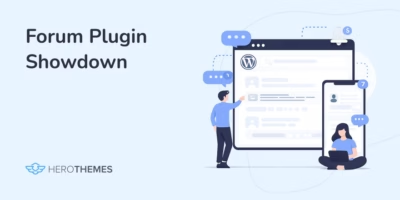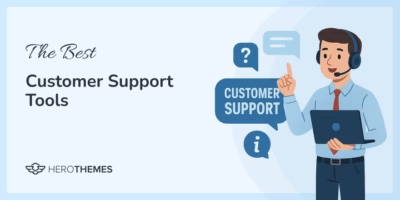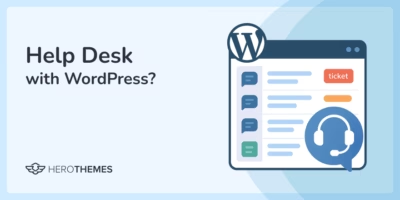10 Best Healthcare Chatbots of 2026 (Free and Paid Solutions)
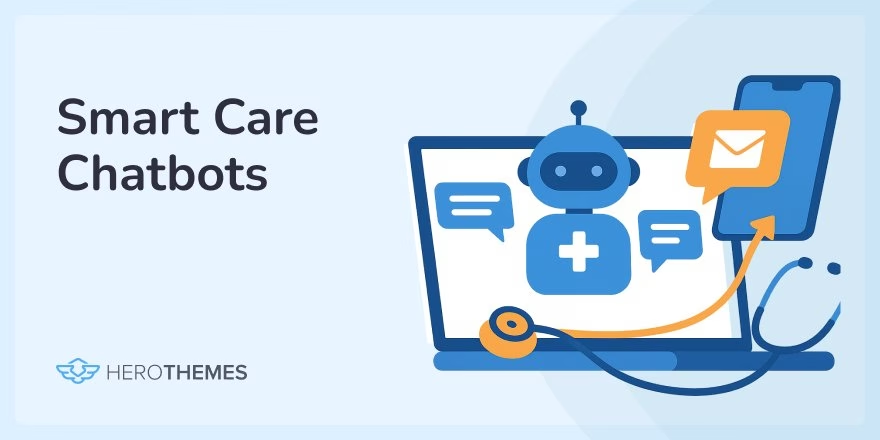
Can a bot really comfort a worried patient or streamline a busy clinic’s workflow? Yes.
Healthcare chatbots are changing how we interact with medical information and services. With AI evolving fast, these chatbots are becoming surprisingly capable (over 75% of healthcare companies are already looking into integrating AI into their systems).
Whether you run a clinic, develop health apps, or are simply a curious patient, here are 20 of the best healthcare chatbots (including free and paid options) that stood out from the crowd.
But first, some quick background.
In This Guide
What Is a Healthcare Chatbot?
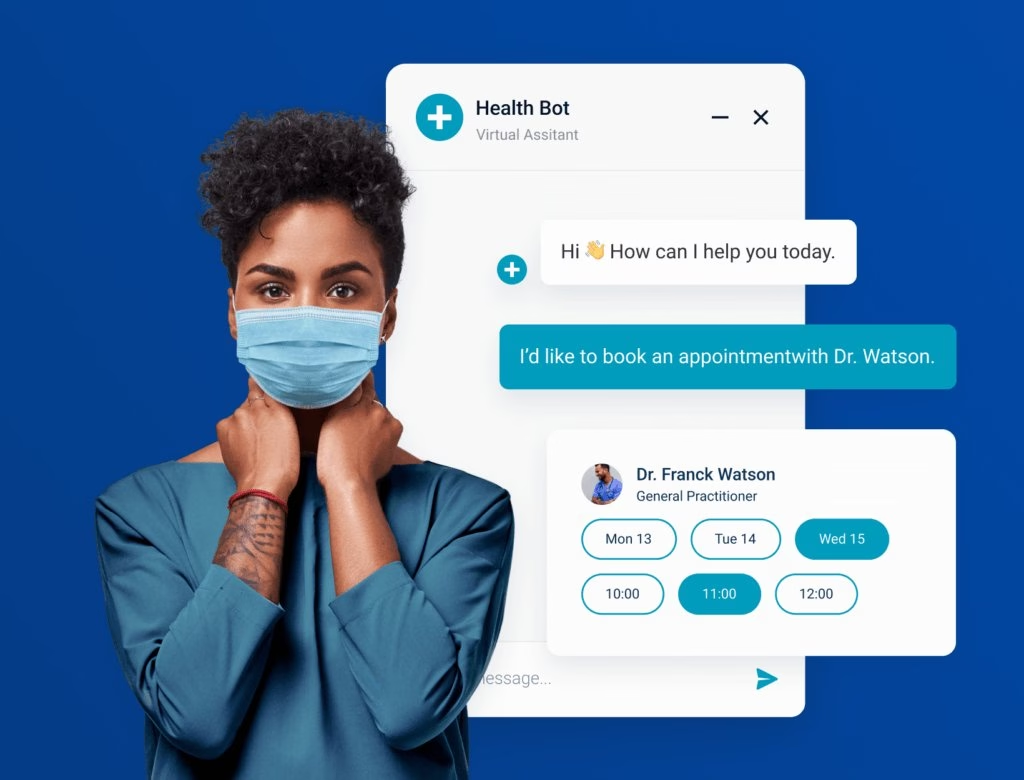
A healthcare chatbot is basically a chatbot. These chatbots can do things like help you check symptoms, schedule appointments, give basic medical advice, remind you to take your meds, or provide mental health support.
Of course, chatbots aren’t doctors—they can’t do physical exams or make definitive diagnoses. But they serve as a first line of support and information.
Why are these bots taking off now?
Advances in AI (like machine learning and large language models) made healthcare chatbots much smarter and more conversational. Plus, the pandemic pushed a lot of healthcare online, and providers needed ways to handle routine queries at scale.
The result is a new wave of chatbots that can talk about everything from insurance benefits to anxiety symptoms. And yes, you can customize them based on your needs and knowledge base.
How I Researched the Best Healthcare Chatbots?
There are hundreds of healthcare chatbots out there, each claiming to be the best. But are they actually the best?
Here’s how I found out:
- Hands-on testing: I spent a great deal of time testing these chatbots. How easy they are to use, their functionality, and whether they fulfill their claims.
- Use cases covered: Healthcare is a broad field, so I looked at all types of chatbots. Those meant for patients, for healthcare providers, for insurance or admin tasks, and so on.
- Key features and technology: The features and technology used in these chatbots are varied. From advanced AI integrations to rule-based chatbots.
- Privacy and compliance
- User feedback and ratings: I might miss out on a few things in a short test period, but hundreds of user opinions are hard to ignore. This information helped me understand critical reviews of these healthcare chatbots, and help you recommend the best.
- Value for money: You don’t want a system that’s too costly to operate (even for doctors), and where you don’t even need half of the functionality, do you?
The 10 Best Healthcare Chatbots (Free and Paid)
1. Heroic Knowledge Base + AI Assistant

Heroic Knowledge Base is actually a knowledge base building software, and with its AI Help Assistant feature you can create an AI chatbot trained on your content.
Think of it as ChatGPT for your website or internal docs.
Key Features:
- Instant, accurate answers from your documents: Instead of a generic AI pulling from the web (and possibly giving wrong info), Heroic’s bot only knows what you’ve fed it.
- No coding required: You install it on your WordPress site, add your content, and enable the AI assistant with a click.
- Highly customizable: Embed the chatbot as a widget on your site, adjust its look and feel, and control its behavior.
- Build a knowledge base from scratch, with features like feedback system, reporting, analytics, search and customization.
Pricing
As of this writing, Heroic Knowledge Base is a premium solution starting at around $67 per year for the basic plan. This is a perfect starting point for small clinics and hospitals.
My Verdict
The Heroic Knowledge Base with its AI assistant feature is a top choice for healthcare organizations that have a lot of existing info (guides, FAQs, articles) and want to make it easily accessible. It’s also ideal for those looking to integrate AI into their systems without a learning curve or hefty costs.
2. Kore.ai
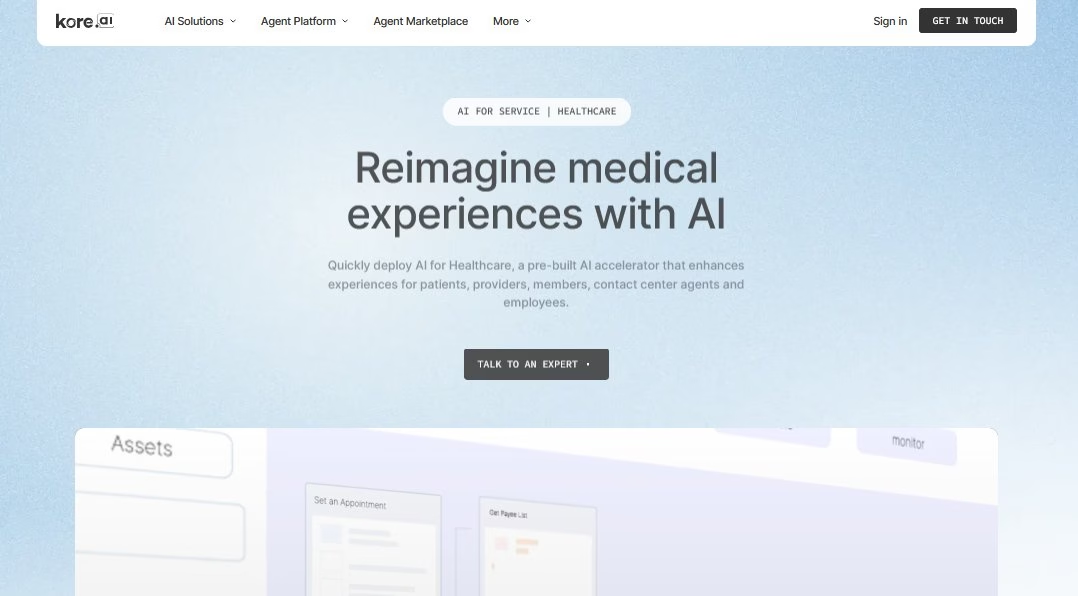
Kore.ai is a leading enterprise conversational AI company, and HealthAssist is their solution optimized for healthcare providers, payers, and life sciences.
If Azure and IBM are familiar tech giants, think of Kore.ai as the specialist up-and-comer.
Kore’s HealthAssist platform lets organizations deploy chatbots that handle everything from patient scheduling to insurance queries, with an emphasis on being an all-in-one conversational platform.
Key Features:
- Kore.ai supports both chat and voice. The voice capability is useful for hospitals integrating it with phone systems.
- Pre-built healthcare workflows: Templates and components for common tasks: finding a doctor, scheduling appointments, checking insurance eligibility, refilling prescriptions, etc.
- No-code drag-and-drop bot designer. This allows you to create and modify dialogues without hardcore programming.
- Omnichannel and consistent experience
- Kore HealthAssist is HIPAA-compliant and secures patient data.
Pricing
Kore.ai is enterprise software. Pricing is custom or based on an annual license plus usage.
My Verdict
Kore.ai chatbot delivers serious flexibility for healthcare teams. It handles both patient engagement and internal support with strong system integrations and quick no-code tweaks. A smart choice for large providers ready for full-scale automation.
3. Sensely (Molly the Virtual Nurse)
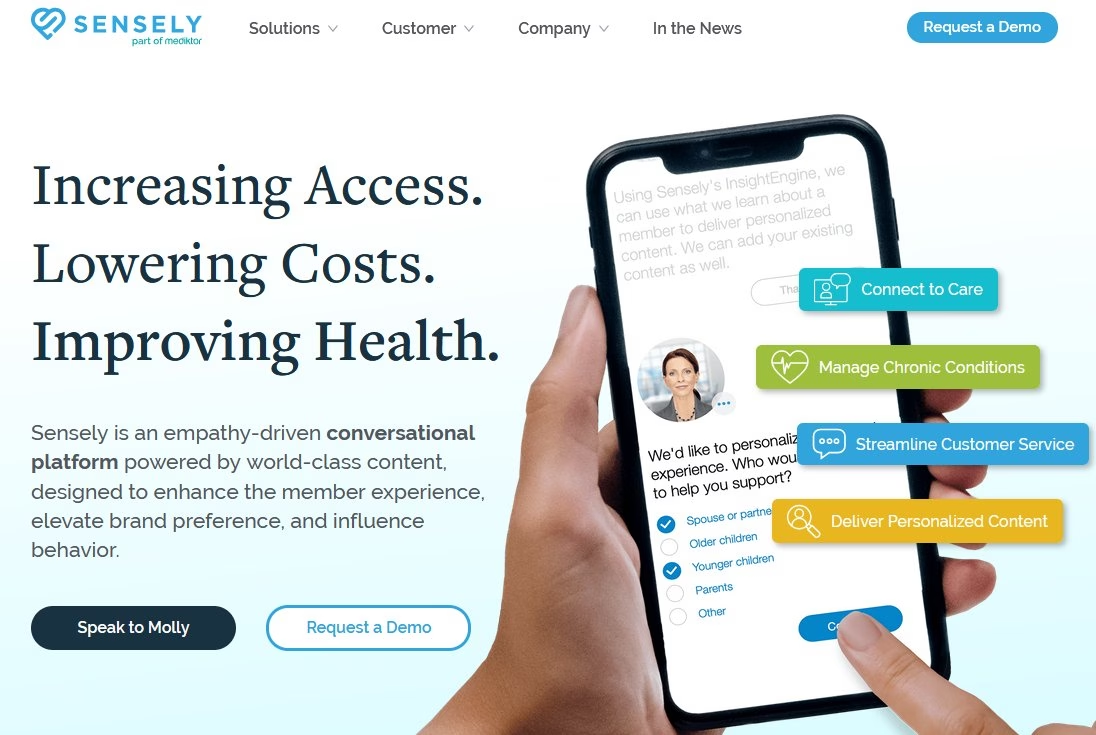
Sensely healthcare chatbot (and avatar) platform is known for its virtual nurse character “Molly.” It uses a friendly 3D avatar that can interact via voice and text.
Sensely’s technology is used in the healthcare industry for symptom triage, chronic disease monitoring, and insurance customer service.
Molly, the virtual nurse, is depicted as a compassionate cartoon nurse who can communicate with patients, listen to their responses, and offer guidance.
Key Features:
- Molly can speak in a soothing voice and you can either talk back (speech recognition) or type.
- Symptom triage with urgency detection.
- Sensely provides health information and self-care advice.
- Integration with services: Sensely can hook into electronic health records and other systems.
- Supports multiple languages and can be customized for different healthcare organizations.
Pricing
Sensely is offered to healthcare organizations (B2B). If a health system or insurer licenses it, end-users (patients or members) get it free through that provider’s app or portal.
My Verdict
Sensely’s Molly is one of the visually memorable healthcare chatbots. Voice, text, and visuals create an accessible, reassuring chat that works well for chronic care or elder support.
4. Healthily: AI Health Assistant
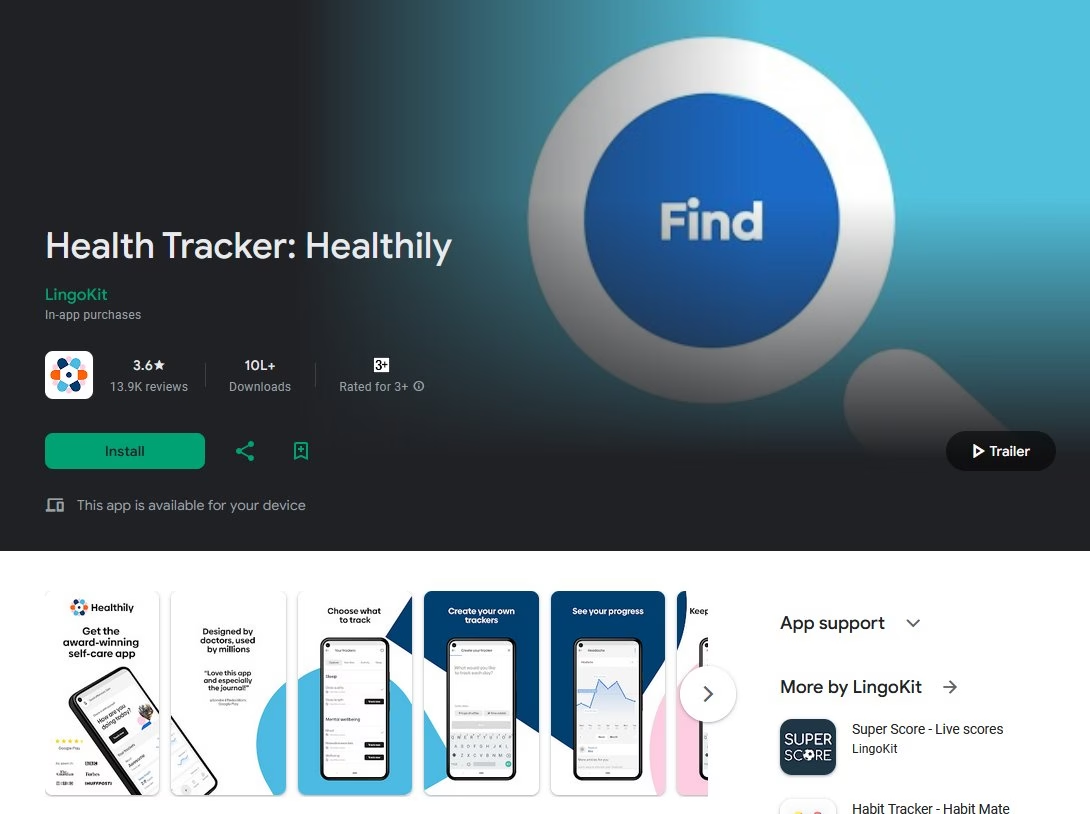
Healthily is a popular AI health chatbot and symptom checker. Similar to Ada, it helps users find out what might be wrong based on symptoms and provides relevant health information.
What distinguishes Healthily is its positioning as a self-care platform. It not only checks symptoms, but also helps you find trusted health information and services.
It’s free to use and accessible via web, iOS, Android, and even messaging apps like Facebook Messenger or Slack.
Key Features:
- The core feature is an AI symptom checker similar to Ada’s.
- “Health library” and self-care guides
- The app can help you find nearby pharmacies, clinics, testing centers.
- Personal health tracking: Like weight, mood, period (for women), etc.
- Free with optional subscription
Pricing
Healthily is free to download and use with optional subscription.
My Verdict
Healthily stands out as a friendly, action-oriented health chatbot. It combines clear guidance with next steps like finding a doctor or suggesting safe remedies, making it ideal for everyday concerns. However, be aware of the occasional overload of possible diagnoses.
5. Microsoft Azure Health Bot
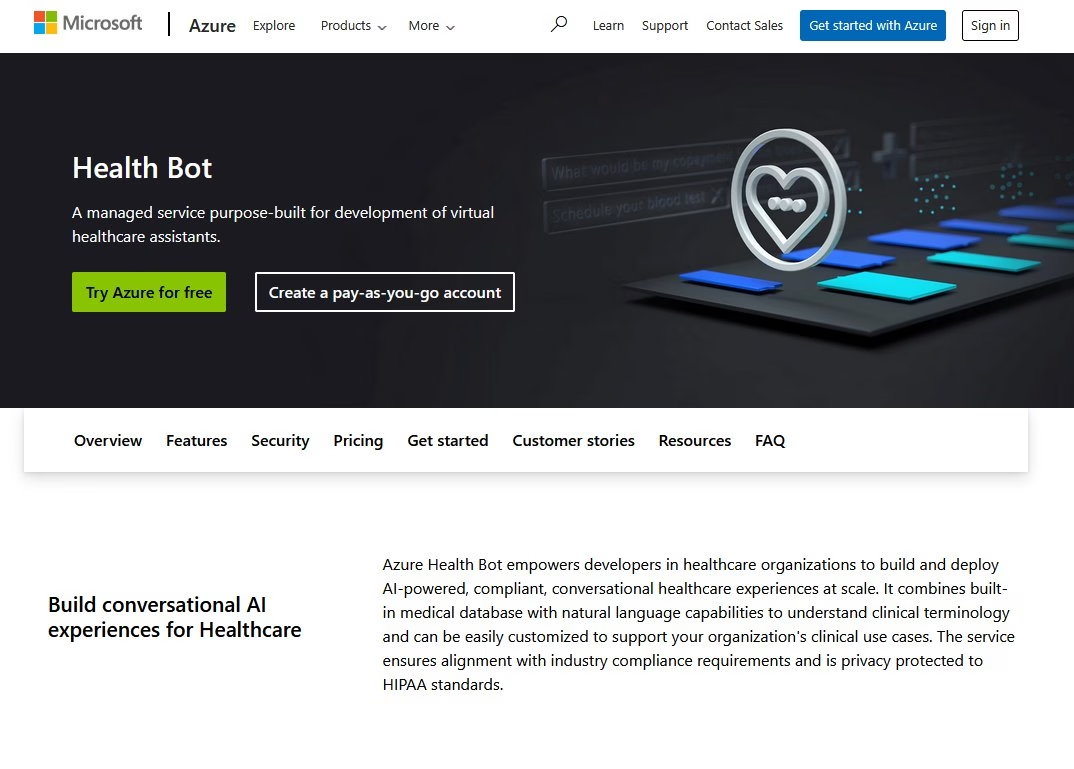
Microsoft Azure Health Bot is a robust cloud service from Microsoft for building compliant healthcare chatbots at scale.
The Azure Health Bot isn’t a single bot, but rather a platform and toolkit. Developers and organizations use it to create custom health assistants.
For example, a hospital might build a triage chatbot with it, or an insurance company might create a benefits helper.
Microsoft provides a bunch of healthcare-specific components out of the box (medical databases, language understanding of clinical terms, templates for common scenarios).
Key Features:
- Built-in medical knowledge: Azure’s Health Bot knows clinical terminology and can ask symptom-based questions like a preliminary exam.
- Compliance and security: It meets HIPAA and industry standards for privacy. Data is under your control, and it can integrate securely with systems via FHIR (the healthcare data API standard).
- Customizable and integrative: You could configure the bot to schedule a doctor appointment if needed, pulling available time slots from your scheduling system.
- It also supports multiple channels (web chat, Microsoft Teams, SMS, etc.).
Pricing
The Azure Health Bot offers a free starter plan, but beyond that, you pay for bot sessions and messages (pricing depends on volume).
The free Azure plan includes 3,000 messages per month. The Standard plan costs $500 per month and includes 10,000 messages.
My Verdict
If you’re at a hospital, clinic network, or insurance company looking to deploy a chatbot across your patient base, Azure Health Bot is a strong contender. It’s kind of an “enterprise toolkit” with everything needed to comply with healthcare rules.
For a small practice with no IT support, Azure Health Bot is overkill.
6. IBM watsonx Assistant
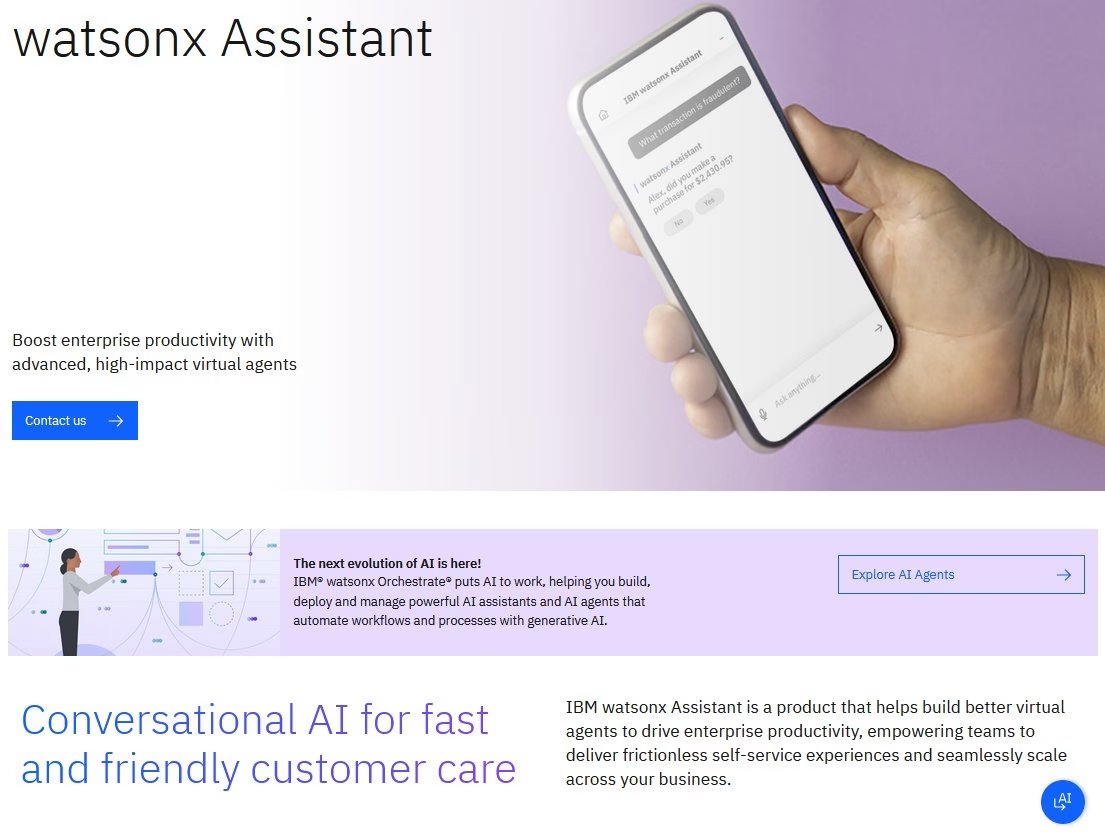
IBM watsonx Assistant is a conversational AI that businesses can customize for many industries.
In healthcare, you can use it to streamline the customer experience and empower patients to help them.
Key Features:
- Helping patients or members navigate health plans and provide instant answers about coverage, deductibles, claim statuses, and healthcare costs.
- Handling complex multi-turn dialogs
- Integrations with backend systems to pull data
- Natural language understanding
Pricing
IBM watsonx Assistant is an enterprise solution, typically custom-priced for the client.
My Verdict
IBM watsonx Assistant is a highly capable chatbot for the healthcare industry, especially with the right setup. It is highly recommended for large healthcare organizations and insurers that need to modernize their customer service.
7. Florence
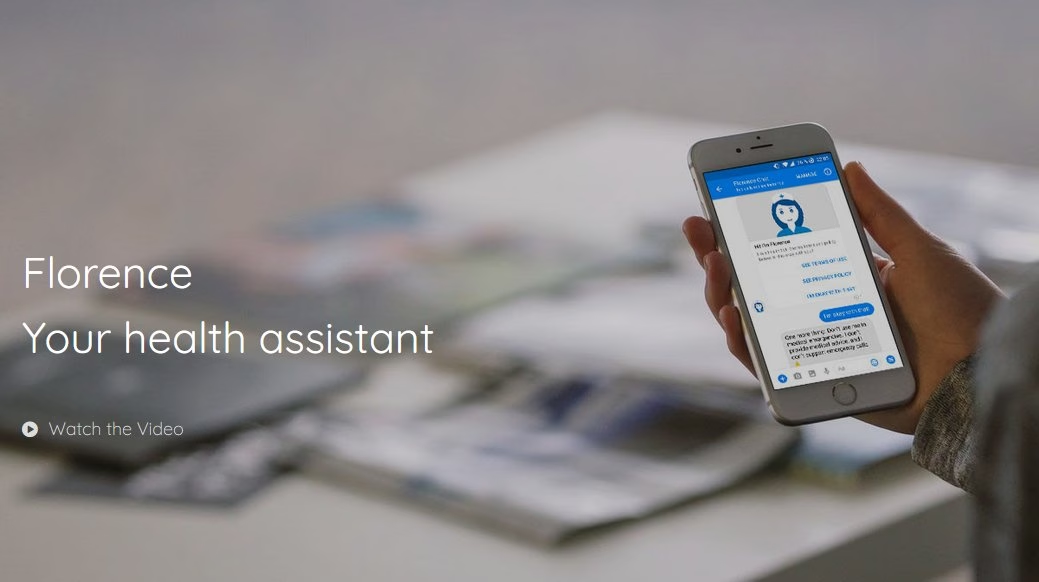
Florence is a simple free healthcare chatbot known as a “personal nurse” on platforms like Facebook Messenger, Skype, and Kik.
Florence helps with medication reminders and basic health tracking. And incredibly useful for day-to-day health management.
Key Features:
- Medication reminders
- Health tracking: Track simple health data like your weight, mood, or period if you input those regularly.
- Find a nearby pharmacy or hospital
- Conversational and personified
- Light symptom advice
Pricing
Free of charge. Florence is available to anyone on Messenger, Skype, Kik. without a fee.
My Verdict
Florence is a must-try for anyone who needs a health habit reminder. It’s free, easy, and could literally prevent a health mishap by keeping you on track with meds. Plus, it demonstrates that not all healthcare chatbots have to diagnose or be complex.
8. BotPenguin
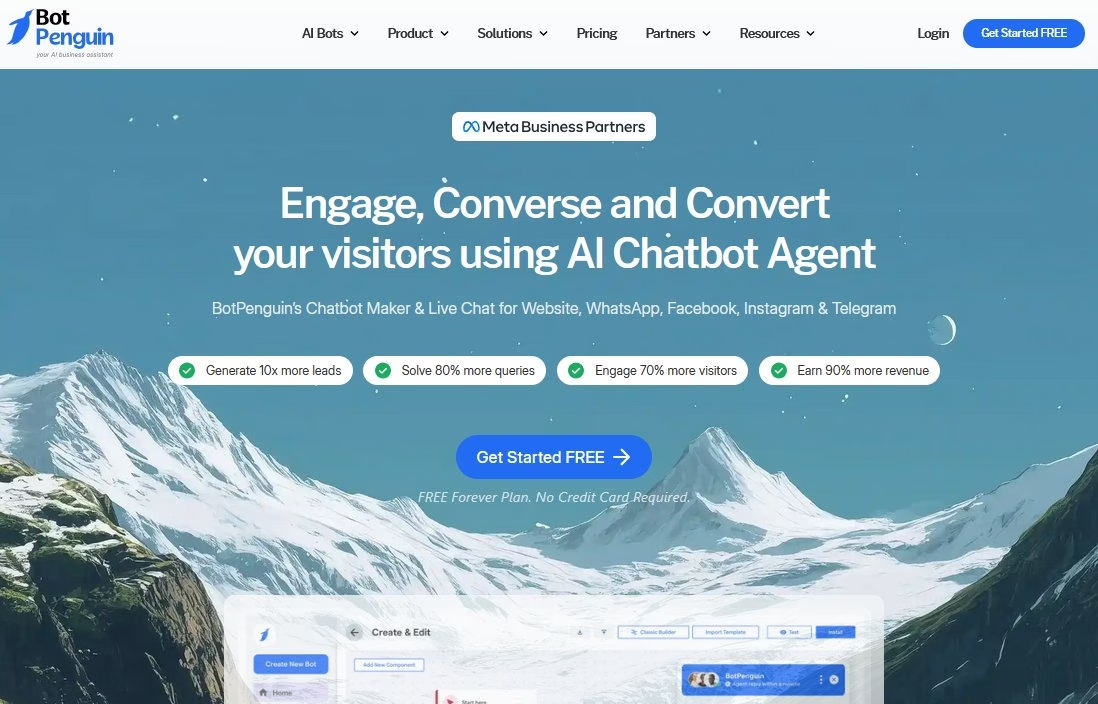
BotPenguin is a no-code AI chatbot platform to create chatbots for various industries, including healthcare.
If you need a chatbot on your clinic’s website to handle basic inquiries or appointment booking, BotPenguin offers templates and an easy interface to do that.
Plus, it supports deployment on websites, Facebook Messenger, and WhatsApp, all without coding.
Key Features:
- Drag-and-drop conversation flow design and pre-built templates for healthcare scenarios.
- Multi-channel support.
- Free plan and low cost.
- Basic AI with customization
Pricing
BotPenguin is a decent free healthcare chatbot.
Paid plans start at $15 a month and offer more capacity and features.
My Verdict
If you’re looking for a quick DIY chatbot for your healthcare practice or project, BotPenguin is a great option. I included it because not everyone has the resources for a large-scale enterprise AI system. This makes it ideal for small clinics on a budget as long as you keep tasks simple and avoid sensitive data.
9. Ada Health (AI Symptom Checker and Health Guide)
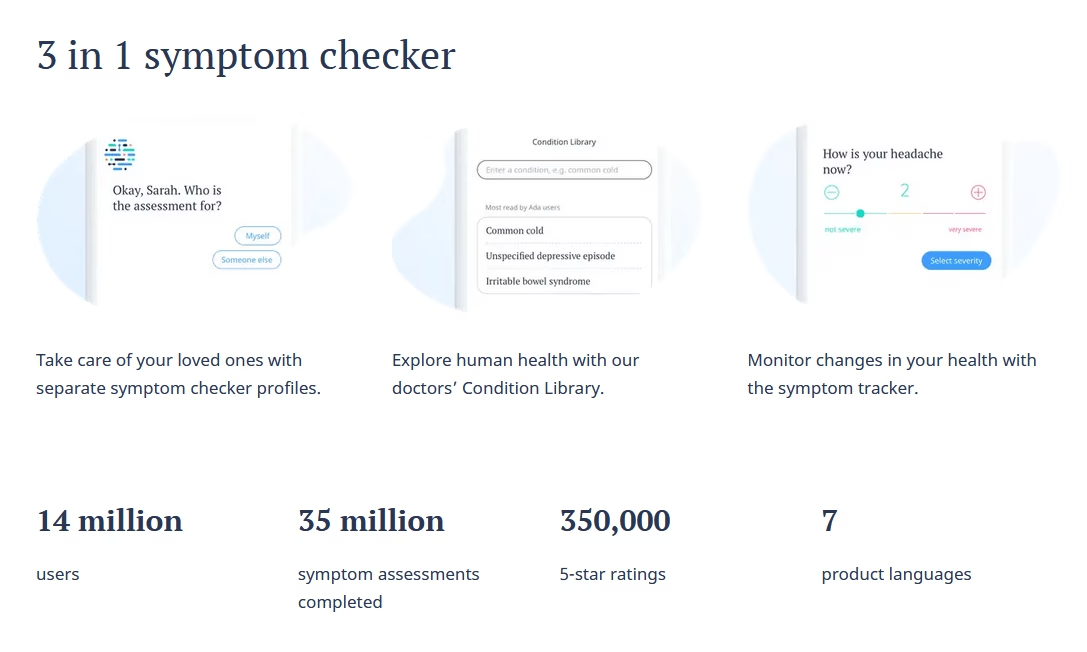
Ada is an AI-powered symptom checker app.
Created by doctors and backed by an extensive medical knowledge base, Ada acts as a “personal health companion” with whom you can chat about your symptoms to receive potential causes and advice.
Ada is available as a mobile app and a web interface. It can also be integrated into health systems or insurer platforms as a white-label symptom assessment tool.
Key features:
- Interactive symptom assessment: Ada asks you a series of personalized questions about your symptoms, medical history, and risk factors, almost like a doctor’s interview.
- Huge medical knowledge base
- Outcome and guidance: After the Q&A, Ada provides a health assessment report.
- Continuous health monitoring
- Multilingual and global
Pricing
For individual users, Ada is free to use.
The company makes money by partnerships with health systems, insurers, and employers, and possibly premium features.
My Verdict
Ada Health is like having a calm, well-informed triage nurse in your pocket. It asks smart follow-up questions, offers sensible guidance, and integrates with telehealth platforms. These features make it a trusted first step when symptoms arise. However, its long lists may unsettle anxious users.
10. Google’s MedLM
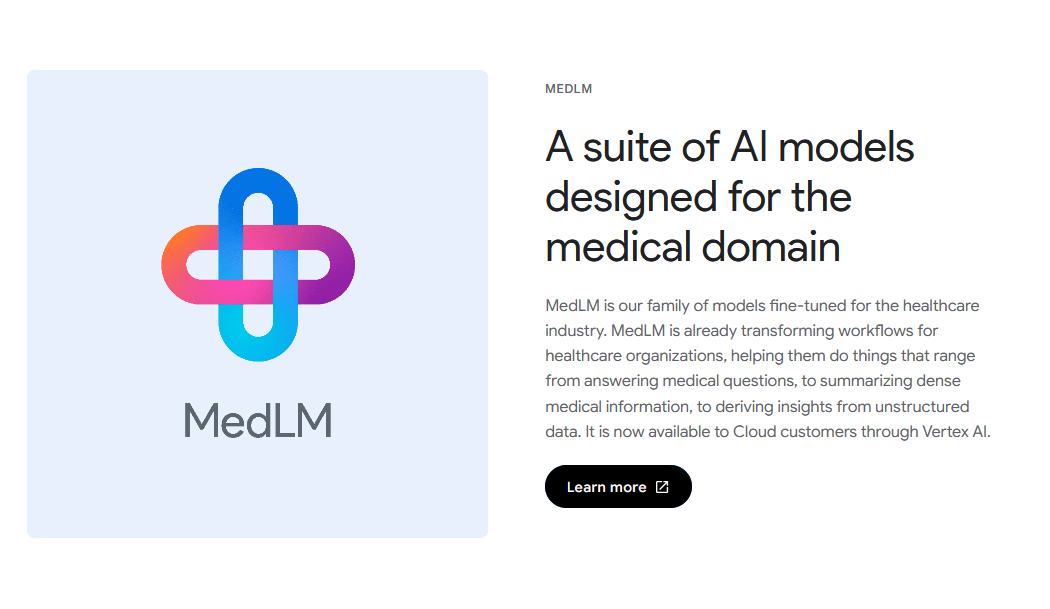
MedLM is an advanced large language model (LLM) developed by Google specifically tuned for the medical domain.
It’s essentially Google’s “medical chatbot” brain. MedLM is designed to answer medical questions at a level closer to an expert.
Key Features:
- Expert-level medical knowledge
- Human level performance on medical exams
- The chatbot can be used to answer patient queries and provide medical info
- Clinical testing and feedback
- Privacy and safe deployment
Pricing
Google’s MedLM model is available through Vertex AI (a fully-managed, unified AI development platform for building and using generative AI).
My Verdict
MedLM is the cutting edge of AI in healthcare Q&A. It’s worth including on this list because it shows where things are headed. With the right setup, you can use such healthcare-specific models to create interactive chatbots, and reduce the workload of your hospital support team.
Final Thoughts
In the past few years, healthcare chatbots have become incredibly diverse and capable.
The 10 healthcare chatbots above showcase how AI is being used to improve patient education, access to care, chronic disease management, mental well-being, and more.
You might just need a simple chatbot like the Heroic AI Assistant, which can answer patient questions based on your own data.
Alternatively, you can use tools from IBM, Google, or Microsoft to create a custom chatbot for healthcare.
The choice depends on your needs.
Further Reading
10 Best AI Chatbot Plugins for WordPress (Free and Paid Options)
9 Best Restaurant Chatbots for Ordering, Reservations and Support
Rule-Based Chatbots: A Beginner’s Guide with Examples
Best AI Virtual Assistants for Small Businesses
12 Best Chatbot Use Cases and Examples
Best Internal Chatbots for Employee Support and Productivity
Chatbase Review: Build AI Agent for Customer Support


